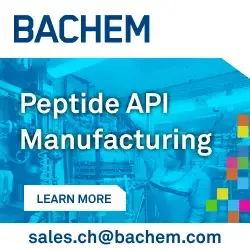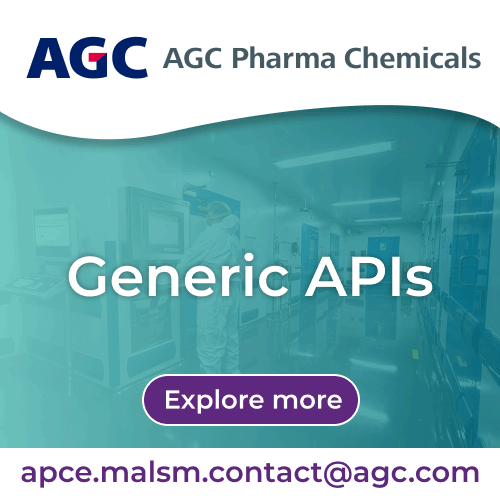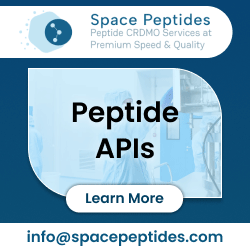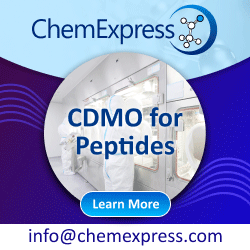Overview of peptide development & manufacturing services for APIs & more on contract manufacturers offering synthetic peptide therapeutics.
Q1. What are peptide APIs?
Peptides are smaller versions of proteins. People may confuse peptides with proteins as both are made up of amino acids. However, peptides contain far fewer amino acids as compared to proteins. Even though pharmaceutical peptides were first introduced decades ago, peptide contract manufacturing is still considered a young market with promising peptide therapeutic capabilities and exciting potential for the contract API manufacturing industry.
There is a broad array of physiological activities influenced by bioactive peptides, and these biological activities are controlled by the type, number, progression, and nature of the amino acids constituting the peptides. For example, the majority of the hormones in our body are biologically active peptides of widely varying lengths.
Peptides are found in all living organisms and play a key role in all manner of biological activity. With inherent abilities to block and/or enhance signal transfers in the human body, peptides, when harnessed as active pharmaceutical ingredients, can treat a host of metabolic diseases, cardiovascular and heart conditions, and neurodegenerative disorders.
Today, there are more than 40 peptides in the pharmaceutical market and more than 100 in clinical peptide development. Many health and cosmetic products contain different peptides for many uses, such as their potential anti-aging, anti-inflammatory, or muscle building properties.
Although in the past the pharmaceutical industry had reduced their interest in peptides research, in recent decades, they have rekindled their interest in synthetic peptide API manufacturing (peptide contract API manufacturing) as a result of contemporary novel technological accomplishments, strategic peptide development services, advances in the areas of formulation and enhanced drug delivery technology of peptides.
Peptide therapeutics tap into the direct hard wiring of human physiology, yielding substantial and far-reaching benefits for drug treatments and therapies. Applications of products obtained via synthetic peptide API manufacturing, are explored in the subsequent question.
Q2. What are the applications of synthetic peptides?
Peptides synthesis services and applications are gaining increasing popularity as a result of the developments in biotechnology and bioengineering areas and for a number of research purposes.
Synthetic peptide API manufacturing produces synthetic peptide APIs (active pharmaceutical ingredients) which have several important applications in biochemistry, molecular biology, immunology, and medicine.
In the pharmaceutical industry, some of the applications of synthetic peptide include:
- Peptide supplements
Due to the potential health benefits of peptides, many peptide supplements are available in the pharmaceutical industry, that peptide manufacturers have derived either from food or made synthetically.
- Peptide vaccines
Conventional vaccine strategies have been highly efficacious for several decades in reducing mortality and morbidity due to infectious diseases. Peptide vaccines are an attractive alternative strategy that relies on using short peptide fragments to engineer the induction of highly targeted immune responses, consequently avoiding allergenic and/or reactogenic sequences.
- Peptides as radio-theranostic agents
Tumor-targeting peptides enable more precise diagnostic imaging while simultaneously advancing new therapeutic paradigms for next generation image-guided surgery, tumor-specific chemotherapeutic delivery and tumor-selective targeted radiotherapy. A promising approach to improve both diagnostic sensitivity/specificity and definitive therapy, is the evolving field of tumor-targeting peptide therapeutics and antibodies.
- Cell-penetrating peptides as molecular carries
Cell penetrating peptides (CPPs) are generally 5–30 amino acids long which, for their ability to cross cell membranes, are widely used to deliver proteins, plasmid DNA, RNA, oligonucleotides, liposomes and anti-cancer drugs inside the cells.
- Synthetic peptides as affinity ligands
Affinity ligands are molecules that are capable of binding with very high affinity to either a moiety specific for it or to an antibody raised against it. There is a pressing need for high-affinity protein binding ligands for all proteins in the human body and other proteomes. Synthetic peptides APIs, produced via peptide API manufacturing or contract API manufacturing, can be used as affinity ligands.
- Synthetic peptides as protein mimics
The design and generation of molecules capable of mimicking the binding and/or functional sites of proteins represents a promising strategy for the exploration and modulation of protein function. Synthetic peptides APIs have proven an excellent type of molecule for the mimicry of protein sites because such peptides can be generated as exact copies of protein fragments, as well as in diverse chemical modifications.
Q3. How are custom peptides synthesized?
Contract manufacturing for peptide APIs is a complex process involving sophisticated technology and expert oversight. Furthermore, state-of-the-art downstream processing (DSP) technologies and innovative methodologies are required to address a wide range of customer needs.
The key to large scale peptide (CMO peptides) production via contract peptide manufacturing is to optimize process development and achieve highly efficient conversion at every amino acid coupling to produce a high-purity crude synthetic custom peptide and minimize the demands on downstream processing.
The production of large scale peptides (CMO peptides) is accomplished using solid-phase or liquid-phase peptide synthesis services, fragment condensation and other novel technologies.
Solid and liquid phase synthesis are the most commonly used methods for large scale peptide contract manufacturing (CMO peptides) and peptides are often classified into: (1) SPPS - Solid Phase Peptide Synthesis and (2) LPPS - Liquid Phase Peptide Synthesis. These peptide synthesis services are explored in detail, below.
(1) LPPS - Liquid Phase Peptide Synthesis
Liquid-phase peptide synthesis is a classical approach to custom peptide synthesis. It has been replaced in most labs by solid-phase peptide synthesis services. However, it retains usefulness in large-scale production of peptides for industrial purposes. The liquid-phase approach is used for the synthesis of short peptides, such as di- and tripeptides, and C-terminally modified peptides, such as enzyme substrates.
(2) SPPS - Solid Phase Peptide Synthesis
Synthetic peptide APIs can be synthesized automatically using solid phase peptide synthesis. It is used to manufacture epitope-specific antibodies, map antibody epitopes and study enzyme binding sites or to design and synthesize novel peptide- or protein-mimetics or even whole enzymes.
It involves the stepwise addition of protected amino acids to a growing peptide chain bound by a covalent bond to a solid state resin particle. The basic concept in solid phase custom peptide synthesis is the step-wise construction of a peptide chain attached to an insoluble polymeric support. This approach permits unreacted reagents to be removed by washing without loss of product.
Each amino acid addition involved in solid phase peptide synthesis proceeds in the following steps:
1. Cleavage of the N-alpha-protecting group.
2. Washing steps.
3. Coupling of a protected amino acid.
4. Washing steps.
This protocol for solid-phase peptide synthesis (SPPS) is based on the widely used Fmoc/tBu strategy, activation of the carboxyl groups by aminium-derived coupling reagents and use of PEG-modified polystyrene resins.
General advantages of solid phase synthesis are easy purification, rapid generation of linear peptide intermediates, as well as the availability of fully automated production processes.
Solid-phase synthesis offers the benefits of shorter process development and GMP peptide manufacturing timelines with greater cost efficiency at small to medium-scale production, it can also remain competitive for larger-scale processes and for producing longer sequences and more complex peptides with elaborate side chains. Solution-phase synthesis (liquid synthesis) on the other hand may be advantageous as product quantities increase.
Q4. What are the practices associated with GMP contract peptide manufacturing?
GMP manufacturing is a system for ensuring that products are consistently produced and controlled according to quality standards. GMP manufacturing is designed to minimize the risks involved in any pharmaceutical production that cannot be eliminated through testing the final product.
cGMP peptide manufacturing starts with the evaluation of different production processes. At this point, the better the yield and purity of the peptide after production, the lesser the need for complex and labor-intensive purification techniques and the lower the overall costs of production.
Many CDMOs and CMOs for peptide manufacturing specialize in synthetic cGMP peptide manufacturing and offer both early- and late-phase peptide development services and commercial GMP contract peptide manufacturing.
Peptides produced under GMP manufacturing peptide conditions adhere to the ICH Q7 (International Conference on Harmonisation of Technical Requirements for Registration of Pharmaceuticals for Human Use ICH Harmonised Tripartite Guideline Good Manufacturing Practice Guide for Active Pharmaceutical Ingredients Q7) guidelines.
Peptides produced under GMP contract peptide manufacturing conditions, via solid and solution phase synthesis (liquid synthesis), purification, lyophilization, and packaging, are the foundation of the quality systems in place for GMP peptide production. QC tests before releasing GMP peptides are also performed in order to ensure the highest quality of peptides.
Furthermore, cGMP peptide manufacturing involves:
- Raw material qualification
- Synthetic method development, validation and scale up
- Product Purification
- GMP analytical method development and validation
- Release specification design and testing
- Stability testing
- In process control and batch record
- GMP packaging
- GMP compliance
Pre-GMP peptide development services & GMP contract peptide manufacturing can help accelerate the peptide drug discovery and development process in the early and late stages of drug development and offer further benefits, including, but not limited to:
- Yield optimization
- Impurity identification and tracking
- Safety assessment
- Economic evaluation
- Process optimization
- Identify storage conditions
Q5. Who are the leading contract peptide manufacturers of peptide APIs?
Some of the leading contract peptide manufacturers of peptide APIs (CDMO & CMO for peptide manufacturing) offering peptide API manufacturing services to the pharmaceutical industry are noted below.
Peptide Manufacturers - CDMOs & CMOs for Contract Peptide Manufacturing:
Bachem
Bachem is the world's leading independent manufacturer of GMP peptides which are used as active pharmaceutical ingredients (APIs) with a range of more than 30 generic products of which more than 20 are peptides. Their generic APIs are used in the field of cancer, diabetes, obesity, fertility and many other areas.
With close to 50 years of experience, Bachem, a CMO for peptide manufacturing, is a strong partner for GMP peptide manufacturing and organic compounds manufacturing from drug discovery and development to fully support you with the required regulatory documentation such as Drug Master Files (DMFs) and Certificates of Suitability (CEPs).
AMRI
AMRI's expert scientists offer crystallization screening using a variety of crystallization techniques. They conduct initial screening on a small scale using various vapor diffusion techniques (sitting drop, hanging drop, sandwich drop and capillary) and batch crystallization techniques (slow evaporation, fast evaporation and antisolvent precipitation).
They use these crystallization techniques for single crystal growth of proteins and peptides for 3-D structure determination. A crystalline formulation has some advantages over its amorphous counterpart, including high concentration and high purity.
ScinoPharm Taiwan, Ltd
ScinoPharm has accumulated considerable experience in the synthetic process of peptide APIs and can rapidly manufacture peptides with high stereoselectivity and yield. Using column chromatography-based purification technology, the purity of the final product and the purification efficiency can both be improved to reduce costs and increase competitive advantage.
ScinoPharm, a peptide CDMO, supplies peptide APIs for generic drug makers in NAFTA, Europe, and Japan. They also offer contract peptide development services to other companies for developing new GMP peptide manufacturing processes, supply INDs, produce commercially at all stages of the drug discovery and development process and offer peptide custom synthesis.
CBL- Chemical and Biopharmaceutical Laboratories
CBL, a CMO for peptide manufacturing, is one of the largest peptide material suppliers in the world, offering peptide starting materials, GMP peptide intermediates, and industrial and commercial-scale peptide contract manufacturing of proprietary and generic GMP Peptides and non-GMP peptides.
CBL offers a wide range of high-quality starting materials and intermediates for solid phase custom peptide synthesis. Competitively priced material is produced at large scale. GMP manufacturing peptide for clinical and commercial material is offered at all stages of the drug discovery and development process.
All Suppliers
















 Bachem Group is a public, innovation-driven company specializing in the development and manufacturing of peptides and oligonucleotides.
Bachem Group is a public, innovation-driven company specializing in the development and manufacturing of peptides and oligonucleotides.













